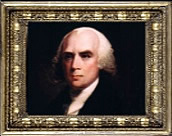

James Madison

Fourth President [1809-1817]
Father of the Constitution
Helped frame the Bill of Rights
President Jefferson's Secretary of State
Author of 29 of the 85 Federalist Papers
What He Did:
At the Constitutional Convention of 1787, James Madison proposed the plan to divide the central government into three branches. He discovered this model of government from the Perfect Governor, as he read Isaiah 33:22;
“For the LORD is our judge, [judicial]
the LORD is our lawgiver, [legislative]
the LORD is our king; [executive]
He will save us.”
Baron Charles Montesquieu wrote "The Spirit of the Laws", a book that was read and studied intently by our Founders. Montesquieu wrote in 1748; “Nor is there liberty if the power of judging is not separated from legislative power and from executive power. If it [the power of judging] were joined to legislative power, the power over life and liberty of the citizens would be arbitrary, for the judge would be the legislature if it were joined to the executive power, the judge could have the force of an oppressor. All would be lost if the same … body of principal men … exercised these three powers." Madison claimed Isaiah 33:22 as the source of division of power in government.
In 1812, President Madison signed a federal bill which economically aided the Bible Society of Philadelphia in its goal of the mass distribution of the Bible. “ An Act for the relief of the Bible Society of Philadelphia” Approved February 2, 1813 by Congress
On April 20, 1816, Congress also approved relief for the Baltimore and Massachusetts Bible Societies!
What He Said:
"...we have all been encouraged to feel in the guardianship and guidance of that Almighty Being whose power regulates the destiny of nations, whose blessings have been so conspicuously dispensed to this rising Republic, and to whom we are bound to address our devout gratitude for the past, as well as our fervent supplications and best hopes for the future." First Inaugural Address?
“We have staked the whole future of American civilization, not upon the power of government, far from it. We’ve staked the future of all our political institutions upon our capacity…to sustain ourselves according to the Ten Commandments of God.” [1778 to the General Assembly of the State of Virginia]
“We’ve staked our future on our ability to follow the Ten Commandments with all of our heart.”
“I have sometimes thought there could not be a stronger testimony in favor of religion or against temporal enjoyments, even the most rational and manly, than for men who occupy the most honorable and gainful departments and [who] are rising in reputation and wealth, publicly to declare the unsatisfactoriness [of temporal enjoyments] by becoming fervent advocates in the cause of Christ; and I wish you may give in your evidence in this way.” Letter by Madison to William Bradford (September 25, 1773)
“It is the mutual duty of all to practice Christian forbearance, love, and charity toward each other.”